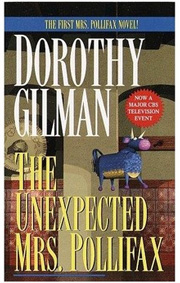 What do you see in the famous illustration on the right: The vase or the two faces? It depends, right?
What do you see in the famous illustration on the right: The vase or the two faces? It depends, right?
So it was today as I reflected on The Unexpected Mrs. Pollifax, the book by Dorothy Gilman that our mystery book club read for February and that we met to discuss today.
While I am a mystery book fan and a lover of thrillers and police procedurals, my wife is not. In fact, the only mystery she ever read and liked was The Unexpected Mrs. Pollifax and the sequels. So when the mystery book club did their book selections for this year, I threw “Ruth’s book” into the pot because I was curious how others would feel about it. A few were familiar with the Pollifax series and it became a finalist for this year’s reading.
The Low Down on the Pollifax Storyline
Emily Pollifax has lived a full life: raised a family, done a lot of volunteer work, had a fine husband who died a few years earlier. Now she’s in her mid-sixties and bored. A regular checkup with her doctor informs her that she is very healthy, but he wisely advises her to find something to fill her life with purpose, a reason to get up and look forward to her day. She decides to take him at his word and decides she wants more adventure and a chance to do something for her country. (It is only five years after JFK exhorted his countrymen to “ask what you can do for your country” and the cold war is at its peak.)
So she goes to the CIA headquarters in Langley, Virginia and offers her services as a spy! Due to some confusion and poor communication there, she is in fact hired to perform a single very low risk assignment. She is sent as a tourist to Mexico to engage in three weeks of normal sightseeing, and then pick up a book containing hidden reports from a top CIA operative, and bring it back to Washington.
But it all goes wrong. Her contact is murdered and she is kidnapped along with another American spy by Chinese agents. The kidnappers cannot find the hidden information and move the two Americans to a small prison camp they maintain in Albania. It is clear that they will be tortured and executed, so Mrs. Pollifax, against all odds, orchestrates an escape.
From dodging bullets to obtaining important intelligence for the CIA, it was quite unlike her quiet life attending the garden club in her New Jersey hometown. Quite unexpected.
The Upshot at the Mystery Book Fan Discussion
At the start of the club’s discussion, I asked the members what they thought about Mrs. Pollifax, the book’s character. Everyone agreed: she is a likable character. But as discussion went on, it was clear that a majority were not so sure they really like the story.
What was most interesting was trying to pinpoint the reason the underlying dissatisfaction.
 At first thought, it was that the “book was dated.” Gilman wrote the book in 1966, so is it that we don’t have a taste for the style of older books? Yet some of these same members had no trouble reading and re-reading books by Agatha Christie, Erle Stanley Gardner, Raymond Chandler, and (earlier) Ed McBain who all wrote in an earlier time frame.
At first thought, it was that the “book was dated.” Gilman wrote the book in 1966, so is it that we don’t have a taste for the style of older books? Yet some of these same members had no trouble reading and re-reading books by Agatha Christie, Erle Stanley Gardner, Raymond Chandler, and (earlier) Ed McBain who all wrote in an earlier time frame.
Well, maybe the unease was because it dealt with dated issues or settings, like the cold war and Albania under communism. But the group has read historical mysteries with varying degrees of interest, most recently Murder on the Appian Way. And though I wasn’t a huge fan of that book by Steven Saylor, last month I really enjoyed a great mystery set in Soviet Russia of the 1930s.
My own theory about why the book ended up with an average grade of 75 from the group (with a low of 52 and a high of 90) is that the book sounded like a light-hearted spoof of the thriller genre, just then emerging on the scene. It was told, it seemed to me, with tongue in cheek. A 65 year old woman with no training and no experience at all actually does better than the trained agents of China, Russia, and the USA combined? A writer who really wants to draw me into the storyline will do everything possible to make that incredible leap sound very, very, very plausible.
Let me illustrate. When the club read Flashback by Gary Braver, the members felt easily drawn into the plausibility that toxins from a jellyfish found on Cape Cod could be used in a medical research lab to produce a cure for Alzheimer’s disease. It was the way Braver developed the story, weaving in facts from science such that the story sounded authenticate. The result was that the entire plot became more thrilling, urgent, and dramatic as readers believed it was plausible.
But Gilman didn’t create that sense of plausibility. And while the book was not comical and produced fewer chuckles than Spenser’s lines in a Robert B. Parker mystery, there was nevertheless a great disparity, a kind of baffling incongruity between real life and Mrs. Pollifax’s life. Like Gilman was writing with a straight face and a wink.
One person wondered if the book might be called a “cozy.” I mumbled something about it being in a genre of it’s own. Truth is, I left the meeting partly puzzled about how to think about the book; then again, I left with a shrug – if the book wasn’t fluff, it was at least “fluffy around the edges” as one member said. I didn’t feel terrible at giving it a 66.
The Downside of Not Researching BEFORE the Meeting
When I got home, I wanted to double-check the publication date before writing to the group members (a way to keep absent members up to date). So I went to the Dorothy Gilman page at Wikipedia where I realized I had made a mistake at the meeting. I had said something about Gilman being a Canadian. But the Gilman entry in Wikipedia clearly said she was born in New Brunswick, New Jersey. Maybe I had somehow remembered “New Brunswick” since my wife Ruth was born in that Canadian province.
But interesting nevertheless that widow Emily Pollifax lives in… New Brunswick, New Jersey. Maybe it means nothing, but later I began to feel that it was no coincidence.
The same entry revealed that Gilman had in fact written about Pollifax first in 1966 (at 43) followed by 14 more books in the series, ending with Mrs. Pollifax Unveiled in 2000 (at 77). And that she was awarded the annual Grand Master by the Mystery Writers of America in 2010, less than 2 years before she died from Alzheimers at 88 years old.
But what really surprised me was a list of 23 other books (non-Pollifax books) that she wrote between 1949 and 2002. Many of the earlier were children’s books, and later books were young adult fiction. The first was Enchanted Caravan, a story of a father and daughter that spend a summer traveling about in a converted bus, experiencing adventures at the circus and meeting new traveling companions, all the while supporting the expenses by selling ice cream along the way. A family theme but mixed with an awe of adventure.
In 1965, Gilman got divorced from her husband of 20 years and her children were off to college. Did this influence the Emily Pollifax that Gilman created that same year? A character who, although older, was widowed with two older children married and living in distant states? Was Gilman just then wondering where her own life was headed? Was she feeling that her own life was altogether too expected?
Apparently so. In 1978, Gilman published A New Kind of Country, an autobiographical account of her early 1970s retreat to a solitary life in a small lobstering village in Nova Scotia. It was part of a journey of self-discovery that began with the realization that she had always “belonged” to someone who set the boundaries of her life, first as a daughter, then as a wife, and finally as a mother. For the first time in her life she began to see who she was without all of the roles. For her, indeed, this was a new kind of country.
“What did I learn? I learned to fashion a day out of nothing at all and to give it shape and balance. I learned how to make a blueberry pie, to be very quiet and watch birds circling and tomatoes ripening. I learned how to work hard physically, to sickle grass, haul earth, dig holes and trenches, fight slugs, and cultivate a garden. I made new friends, and one of them was myself…I learned this, too: that we are each, inside of us, a country with our own mountains and plateaus and chasms and storms and seas of tranquility but like a Third World country we remain largely unexplored, and sometimes even impoverished, for want of a little investment.”
I am stunned at the reminder that authors say a lot about themselves through their fictional creations. Not in all cases. And particularly so because so many mystery writers follow conventions and formulas through which their own character seldom shines.
I am newly intrigued at how important the idea of “an unexpected life” might be to Gilman in 1965 when she created Emily Pollifax. Likely she would strongly identify with these words of Shonda Rhimes, author of The Princess Diaries:
“We all think we’re going to be great and we feel a little bit robbed when our expectations aren’t met. But sometimes expectations sell us short. Sometimes the expected simply pales in comparison to the unexpected. You got to wonder why we cling to our expectations, because the expected is just what keeps us steady. Standing. Still, the expected’s just the beginning, the unexpected is what changes our lives.”
Full Circle
Several years ago, our club read a mystery which brought about a rare degree of unanimity from the members – we all thought it was an awful book. But we remember the book for something else, too. And we sometimes still tease our good friend Mike who raised his evaluation grade after meeting the author personally and listening to her speak of the writing process she used.
Now I will say, without a lot of apology, that I must raise the score of 66 that I gave to The Unexpected Mrs. Pollifax. This morning (and while reading the book) I was focused on the vase (the book itself); now I perceive that the vase is merely the [back]ground and the two faces, the unexpected Emily Pollifax juxtaposed with the unexpected Dorothy Gilman, are the “figure.” Tease me if you must but I’ll go for an 82.
May we all discover an unexpected life for ourselves.
“Nearly all the best things that came to me in life have been unexpected, unplanned by me.” -Carl Sandburg



Well done, Dick, both the apology to Dorothy Gilman and the adjustment to your “grade” on her novel. I though she and her story deserved better even though I too commented that the book felt “dated.”
Very smart man!!!